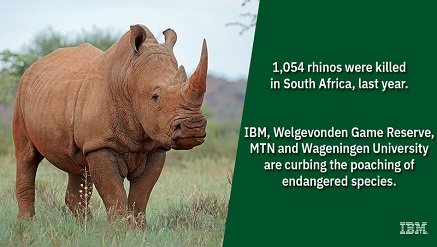News
IBM, MTN Deploy IoT Technology to Save Africa’s Rhinos

Ahead of World Rhino Day 2017 this week, IBM; MTN, a leading African telecommunications provider; Wageningen University (WU) in the Netherlands and Prodapt, on Tuesday announced they are harnessing IBM Internet of Things (IoT) technology as part of the MTN Connected Wildlife Solution.
The solution will help predict threats and combat the poaching of endangered rhinos at Welgevonden Game Reserve in South Africa, with the intent to expand the solution to other reserves in future.
Today South Africa is home to more than 70 percent of the world’s remaining rhino population. Conservationists are battling to protect the dwindling number of these iconic animals that are being killed for their highly-prized horns*.
Over the past decade, more than 7,000 rhinos were killed across the African continent and in 2016, 1,054 were reported killed in South Africa alone.
“One of our primary objectives is to protect wildlife, especially endangered species. We were looking for a solution that would help us better understand possible threats and weed out those coming from poachers so we can react ahead of time and prevent harm to animals,” said Bradley Schroder, chief executive officer of Welgevonden Game Reserve. “This project will be a profound breakthrough in the creation of connected wildlife solutions, a wildlife management concept that aims to harness IoT technology to better manage and protect wildlife and other assets.”
This new predictive capability stems from research performed by Wageningen University. Ranked the best university in the Netherlands for 12 straight years, the university features an animal sciences group focused on research and education related to the health and welfare of animals and people.
According to research conducted on Welgevonden Game Reserve, prey-animals in the wild react in different ways, depending on the type of threat they encounter and the perceived danger from predators such as lion and leopard or the presence of people in the vicinity.
This research has been combined with MTN’s Connected Wildlife Solution which leverages IBM’s IoT technology and the university’s predictive analytics, to create an innovative solution that gives game reserves a powerful new tool in the fight to save endangered species.
Protecting the rhinos begins with fitting collars containing custom sensors onto prey-animals including zebra, wildebeest, eland and impala, which will transmit data about their behavior to the IoT platform.
The data collected from the LoRa sensors is communicated via the LoRa WAN Network Server (LRSC – Long Range Signal & Control) and backhauled over the MTN 3G/4G network.
Through the platform, the solution collects animal location information, movement, direction and average speed of travel, along with other data.
The data is used by Wageningen University to create approximately 20 rule-based patterns based on the animals’ response to threats. As a result, animals such as zebra will act as sentinels with their response patterns becoming an early warning system to protect the rhinos.
The predictive nature of this solution takes away the reliance on game reserve teams to be in the right place at the right time, or to respond to events, such as the distant sound of gunfire; and the teams can take proactive action that keeps rhinos safe.
“Over the years, we have seen that animal tracking technology has been used reactively in game reserves. Welgevonden needed a more proactive solution to take the fight to protect the rhinos further. With the solution designed for Welgevonden, MTN, along with our partners, can better predict and anticipate potential poaching activity. This allows the ranger to take pre-emptive action before any threat happens,” said Mariana Kruger, general manager at MTN Business.
Welgevonden Game Reserve was chosen for its specialist wildlife management expertise, its well-known research and development capabilities as well as its excellent reputation in rhino protection. “Welgevonden is one of the best managed game reserves in the world and we need such skills to ensure the success of a project of this nature,” said Prof Herbert Prins of Wageningen University.
“The Internet of Things is changing the way we live and work, and we are finding new applications for IBM’s IoT technologies in businesses across the spectrum. Now we’re helping curb rhino poaching and preserve endangered species on the African continent.” says Hamilton Ratshefola, country general manager for IBM South Africa. “IBM’s IoT solutions enable businesses to solve industry specific problems and transform their companies and industries.”
MTN is an emerging innovator in the Internet of Things, with hundreds of clients across 22 countries. MTN is building an ecosystem of vertical partners and an ecosystem of over 3 million active M2M connections. Together these connected devices, sensors and systems provide insight whilst solving real business challenges around the continent.
IBM’s IoT technology features powerful cognitive computing capabilities that don’t merely gather and predict but truly understand the patterns and relationships in the massive amounts of data being collected by the sensors in field.
Today, IBM is an established leader in the Internet of Things (IoT) with more than 6,000 client engagements in 170 countries, a growing ecosystem of over 1,400 partners and more 750 IoT patents which together help to draw actionable insight from billions of connected devices, sensors and systems around the world.
News
Tech Executives Double Down on AI, Talent and Adaptive Strategies to Lead in the Intelligence Age

KPMG’s Global Tech Report 2026 reveals that organisations worldwide are moving beyond pilots and seeking to embed AI into core workflows and offerings, striving to scale investments. The new report identifies that while expectations are high and adoption is rapid; scaling can introduce additional complexity and returns vary widely.

- 68 percent of organisations surveyed aim to reach the highest level of AI maturity by the end of 2026, yet only 24 percent are there today.
- 88 percent are investing in building agentic AI into their systems.
- 74 percent say their AI use cases are delivering business value, but only 24 percent achieve ROI across multiple use cases.
- 90 percent plan to grow partnerships and tech ecosystems over the next year, yet 53 percent still lack the talent needed to bring their digital transformation plans to life.
- 78 percent agree they must take more risks on emerging technologies to stay relevant.
The report asks: Can ambition match reality, and can organisations keep one eye on the next wave of innovation while delivering on today’s agenda?
“The future belongs to leaders who turn intelligence into advantage. Our research shows organisations are pushing past the early phase of ‘AI roulette’, placing scattered bets on multiple technologies, and are now increasingly focused on delivering value. When ambition meets disciplined execution, value compounds.
“Our 2026 Global Tech Report provides a synopsis of the critical things that high performers are doing better than most; a checklist for tech leaders looking to improve their organisational performance, emulate the high performers, and deliver higher ROI”. – Guy Holland, Global Leader, CIO Center of Excellence, KPMG International
”As Africa enters the Intelligence Age, the differentiator is no longer access to technology, but the ability to build the skills, governance, and operating models required to scale it responsibly. While organisations are accelerating AI adoption to drive productivity and growth, the real determinant of value lies in workforce readiness, executive alignment, and disciplined execution.
Those that invest early in digital skills, human-AI collaboration, and adaptive leadership will be best positioned to translate innovation into sustainable commercial and economic impact.” – Marshal Luusa, Partner: Technology & Innovation Lead, KPMG One Africa
Key findings from the report
Tech maturity accelerates: Leaders set their sights on the top
Half (50 percent) of global tech leaders surveyed expect to reach the highest level of technology maturity in 2026, compared to only 11 percent today. This surge in optimism is fuelled by a move from isolated experiments to integrating AI and advanced technologies into core systems and scaling their impact.
High performers, those organisations leading in technology maturity, process maturity and value, are already reaping the rewards, reporting an average ROI of 4.5x, more than double the industry average of 2x. These leading organisations have progressed beyond pilot programs, prioritising the scaling of innovation and continually adapting to maintain a competitive edge in a fast-evolving environment.
Other organisations reporting higher ROI include smaller firms (3.6x), those with fewer cost pressures (2.6x), and transformation‑focused organisations (3.2x). The ROI pattern is equally nuanced: rather than a single investment ‘sweet spot’, clear ROI ‘zones’ emerge, from early quick wins to accelerating, enterprise‑wide value as maturity increases.
The age of agentic: AI adoption surges but innovation drives real business value
AI is now seen as a strategic necessity, not just industry hype. Sixty-eight percent of respondents are aiming for the highest level of AI maturity in their organisations. Eighty-eight percent of companies are already investing in agentic AI – autonomous digital agents transforming operations and decision-making. Seventy-four percent of respondents report that their AI initiatives are creating measurable business value, such as improved efficiency and reduced risk.
However, only 24 percent say they are scaling AI and achieving ROI across multiple use cases. This highlights the need for organisations to evolve KPIs beyond traditional financial and productivity metrics and build enterprise-wide alignment to fully realise AI’s potential.
The shift from AI experimentation to large-scale deployment is underway, with leaders working to embed AI into products, services, and value delivery.
Talent and agility power success: Human potential remains central
Human expertise remains central to digital transformation initiatives. Organisations are making significant investments in upskilling their workforce, building adaptive teams, and fostering cultures that embrace change.
Despite the rapid adoption of agentic AI, organisations still expect 42 percent of their tech workforce to remain permanent human staff by 2027 – only a five‑point drop from 2025.
High-performing companies plan to retain even more permanent human talent, with 50 percent remaining in place by 2027, revealing the continued importance of human expertise alongside AI. Despite these efforts, 53 percent of organisations report they still lack the talent needed to realise their digital transformation strategies.
Ninety-two percent of organisations surveyed anticipate that managing AI agents will become a critical skill within five years. The most successful organisations prioritise both technological advancements and people, empowering employees to innovate and adapt.
Strategic partnerships fuel growth: Ecosystems expand for the future
To overcome challenges and accelerate learning, 90 percent of organisations plan to grow partnerships and tech ecosystems over the next year. Strategic alliances are enabling access to specialised expertise, rapid innovation, and shared best practices.
As agentic AI and other advanced technologies become mainstream, organisations recognise the importance of building robust ecosystems that foster co-creation and continuous improvement. Nearly one-third of tech executives are planning to increase investment in centers of excellence, supporting cross-functional teams and controlled experimentation.
Preparing for tomorrow’s breakthroughs: Leaders embrace bold risks
The future is arriving fast, with quantum computing and Artificial Superintelligence (ASI) on the horizon. Leaders are already preparing for these breakthroughs, with 78 percent of organisations agreeing they must take more risks on emerging technologies to stay relevant.
The report urges organisations to maintain strategic foresight, invest in ethical frameworks, and build resilient, future-ready workforces. By balancing ambition with rational thinking and disciplined execution, tech executives are positioning their organisations to turn disruption into durable, compounding value.
News
LIRS to Invoke NTAA to Recover Unpaid Taxes from Bank Accounts, Others

Lagos Internal Revenue Service (LIRS) pursuant to Section 60 of the Nigeria Tax Administration Act (NTAA), plans to ask Nigerian banks to debit bank accounts of employers who failed to remit tax liability.

This was disclosed in a recent notice on Sunday.
LIRS stressed that the move was in line with the implementation of the country’s NTAA and other new tax laws, which took effect on January 1, 2026.
“Where a taxpayer fails, neglects, or refuses to settle any established outstanding tax liability when due, LIRS may exercise its power under Section 60 to direct any of the following persons to pay the amount owed by the taxpayer:
“Banks and other financial institutions; Employers; tenants, debtors, or customers of the taxpayer; Agents, business partners, and any person holding money on behalf of the taxpayer; Any person owing money to the taxpayer, whether presently due or accruing. Once a substitution notice is issued, the person served is statutorily required to remit to LIRS the amount. Specified in the notice from funds belonging to, or payable to, the defaulting taxpayer,” the LIRS notice partly read.
Meanwhile, Taiwo Oyedele, chairman of the Presidential Committee on Fiscal Policy and Tax Reforms, weeks ago ruled out claims that the government would debit personal accounts over tax remittances.
News
Anambra Cuts Monday Pay to Kill Sit-at-Home

Anambra State will implement pro-rata salary payments for civil servants starting February 2026, targeting chronic Monday absenteeism from the long-running sit-at-home order, Information Commissioner Dr. Law Mefor announced Saturday.

Soludo
Speaking at an Awka briefing after the Executive Council’s end-of-tenure retreat, Mefor said improved security and transport have eliminated excuses for the four-year disruption, which cost the state trillions in lost revenue. “Workers enjoyed full pay despite staying away; now, no work means no pay for that day, calculated over 24 working days,” he stated.
Compliance measures include mandatory Monday clock-in forms, with markets urged to reopen fully amid bolstered security. This builds on a January 22 executive order docking 20% pay from teachers absent on Mondays.
Mefor warned that lost Mondays cripple revenue collection and productivity, rejecting alternatives like Saturday shifts as capitulation to agitators.

 E-Financial1 day ago
E-Financial1 day agoFirst Asset Management Receives Upgraded Ratings from Agusto &Co and DataPro

 News1 day ago
News1 day agoAnambra Cuts Monday Pay to Kill Sit-at-Home

 General News1 day ago
General News1 day agoNigeria Treats Religious Violence as Attack on State – NSA Ribadu

 E-Financial1 day ago
E-Financial1 day agoCBN Prepares Fresh Debit Card Rules to Improve ATM Services

 E-Financial1 day ago
E-Financial1 day agoNIBSS, Others Flag 13,417 Nigerian Fraudsters on Person of Interest Portal

 News1 day ago
News1 day agoLIRS to Invoke NTAA to Recover Unpaid Taxes from Bank Accounts, Others

 General News7 hours ago
General News7 hours agoWEBINAR: Techeconomy Business Series Hosts Experts from MTN, Interswitch, BusinessPlus, others this Wednesday

 E-Financial7 hours ago
E-Financial7 hours agoNIBBS to Boost Financial Inclusion with Offline Payment Solutions
























